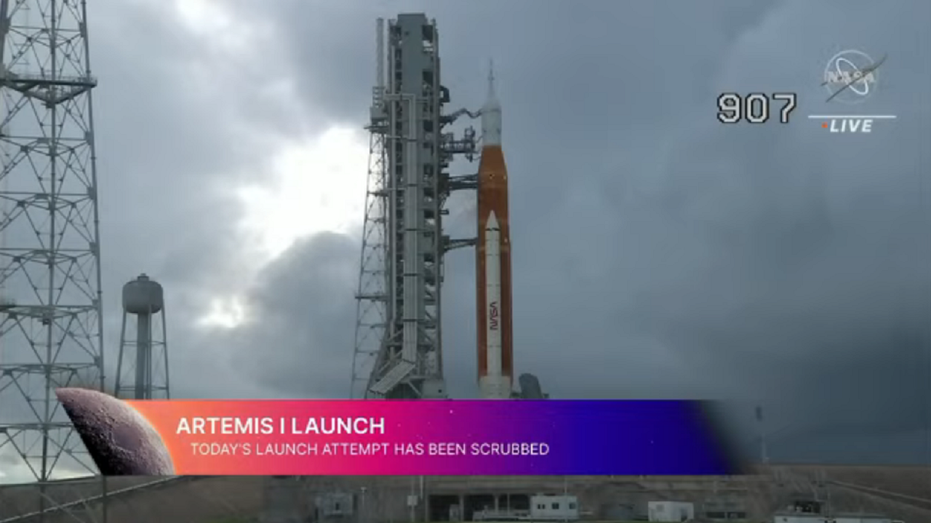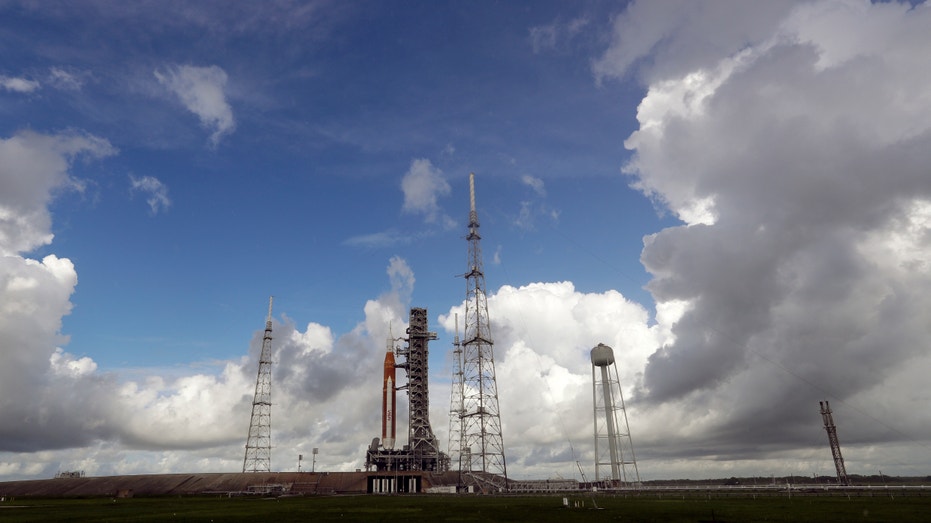NASA's Artemis 1 mission moon rocket launch scrubbed after delays
NASA's Artemis 1 mission delayed at Florida’s Kennedy Space Center
The scheduled launch of Artemis 1 mission moon rocket was scrubbed Monday, NASA officials announced, before later vowing that it is "not going to fly until it's ready."
The rocket was set to lift off on a mission to put a crew capsule with three test dummies into orbit around the moon. The decision to call off the launch comes after crews working on the project "encountered an issue chilling down engine number three," amongst other factors, according to Artemis mission manager Mike Sarafin.
"We need the engine to be at the cryogenically cool temperature such that when it starts that it’s not shocked with all the cold fuel that flows through it. So we needed a little extra time to assess that," Sarafin told reporters Monday afternoon.
"When the team started working through that they also saw an issue with a vent valve at the inner tank," he continued.
NASA CLEARS BLUE ORIGIN, SIERRA SPACE'S ‘ORBITAL REEF’ STATION STATION FOR DESIGN PHASE

NASA called off the launch of the Artemis 1 moon mission on Monday following a series of delays. (NASA)
"So the combination of not being able to get the engine three chilled down and the vent valve issue that they saw at the inner tank really caused this to pause today, and we felt like we needed a little more time," Sarafin added. "There was also a series of weather issues throughout the window."
The next launch attempt won't be until midday Friday at the earliest, but Sarafin suggested that the crew working on the mission need time to assess where things stand.
"We are going to give the team time to rest, first of all and then come back fresh tomorrow and reassess what we learned today," he said. "And then develop a series of options – it's too early to say what the options are... and then we will come back and talk about where we stand tomorrow evening."
Vice President Kamala Harris was among those in attendance Monday for the scheduled at Florida’s Kennedy Space Center and was "pumped the entire time," NASA Administrator Bill Nelson said.
"This is a brand-new rocket, it’s not going to fly until it’s ready," he added. "There are millions of components of this rocket and its systems, and needless to say the complexity is daunting when you bring it all into the focus of a countdown."
BUZZ ALDRIN'S MOON-FLOWN APOLLO 11 JACKET SELLS FOR RECORD $2.8M

NASA's new moon rocket sits on Launch Pad 39-B hours before liftoff on Monday, Aug. 29, in Cape Canaveral, Fla. (AP/Chris O'Meara)
As precious minutes ticked away Monday morning, NASA repeatedly stopped and started the fueling of the Space Launch System rocket because of a leak of highly explosive hydrogen, eventually succeeding in reducing the seepage to acceptable levels. The leak happened in the same place that saw seepage during a dress rehearsal in the spring.
The fueling already was running nearly an hour late because of thunderstorms.
"The fear now is that the problem is in engine 3. If so, it can't be swapped out on the pad but will have to go back to the [vehicle assembly building]," Homer Hickham, a former NASA engineer, told FOX Business. "The delay will be not days but weeks. We shall see. There's tons of data for the engineers to study before they can come to any conclusion about today's attempt and whether the [Space Launch System] rocket can stay on the pad and try for Friday.
The 322-foot rocket is the most powerful ever built by NASA, out-muscling even the Saturn V that took the Apollo astronauts to the moon.
No astronauts were inside the rocket's Orion capsule. Instead, three test dummies were strapped for the six-week mission, scheduled to end with the capsule's splashdown in the Pacific in October.

The NASA moon rocket stands ready less than 24 hours before it is scheduled to launch on Pad 39B for the Artemis 1 mission to orbit the moon at the Kennedy Space Center, Sunday, Aug. 28, in Cape Canaveral, Fla. (AP Photo/John Raoux) (AP Newsroom)
CLICK HERE TO READ MORE ON FOX BUSINESS
The launch is the first flight in NASA’s 21st-century moon-exploration program, named Artemis after Apollo’s mythological twin sister.
Assuming the test goes well, astronauts would climb aboard for the second flight and fly around the moon and back as soon as 2024. A two-person lunar landing could follow by the end of 2025.
Editor's note: This article has been updated for clarity and to reflect information from Artemis mission manager, Mike Sarafin, conveyed during Monday's NASA press conference.
Fox News' Heather Lacy and the Associated Press contributed to this report.





















